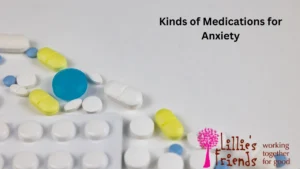Medical Disclaimer
The medicines listed on this website are only there to give you knowledge. Just because they are on the list doesn’t mean that anyone will be given them; in the end, treatment decisions are up to the healthcare workers. The medicines on this list are not all of them. Doctors may recommend other drugs, even ones that don’t contain stimulants, depending on the patient’s specific health needs and circumstances. Read more
Medications for anxiety may lessen the feelings of anxiety by calming the nervous system or enhancing the activity of certain neurotransmitters. They may, however, also have negative effects or interfere with other medications in addition to providing comfort. Selecting an appropriate anti-anxiety medication might sometimes take some time, so it’s important to be aware of the potential outcomes.
You will get more knowledge about the many kinds of anti-anxiety drugs, their possible adverse effects, and strategies to lessen or stay away from them from this page. You may ask crucial questions and offer your healthcare practitioner with more information about the details of your medical history if you are aware of the risk factors and potential repercussions.
Kinds of Medications for Anxiety
For people who are looking for continuous anxiety treatment, there are several different drug alternatives accessible. varied anti-anxiety medications have varied effects but may all aid in restoring equilibrium and calm. Below is a brief synopsis of many often recommended categories:
- Serotonin reuptake inhibitors, or SSRIs, are often prescribed for generalized anxiety disorder (GAD) because of their ability to effectively increase serotonin levels, which in turn boost mood. Among them are escitalopram (Lexapro), fluoxetine (Prozac), and sertraline (Zoloft).
- Serotonin-norepinephrine reuptake inhibitors, or SNRIs, provide dual relief by raising serotonin and norepinephrine levels. Venlafaxine (Effexor), duloxetine (Cymbalta), and desvenlafaxine (Pristiq) are a few examples.
- Tricyclic antidepressants, or TCAs, are a class of older antidepressants [1*] that affect neurotransmitters such as serotonin. Amitriptyline, imipramine, and nortriptyline are a few examples.
- Benzodiazepines: These drugs may be administered to treat anxiety [2*] by amplifying the effects of the neurotransmitter GABA (gamma-aminobutyric acid), which lowers nervous system activity. Alprazolam (Xanax), diazepam (Valium), and lorazepam (Ativan) are other examples.
- Beta-blockers: These medications help control the bodily signs and symptoms of anxiety [3*] , such as a fast heartbeat. Metoprolol, atenolol, and propranolol (Inderal) are a few examples.
- A non-benzodiazepine [4*] alternative that works with serotonin receptors is buspirone (BuSpar).
- Due to dietary constraints, monoamine oxidase inhibitors, or MAOIs, are an older class of antidepressants [5*] that increase neurotransmitter levels but are now less often used. Phenelzine (Nardil) is the drug from this group that is most often prescribed
Typical Adverse Effects of Anti-Anxiety Drugs
While taking an anxiety medication could make you feel less stressed, there might be unintended side effects as well. The following are some common side effects associated with anxiety medications:
- weariness or drowsiness.
- nausea or stomach discomfort.
- feeling lightheaded or dizzy.
- alterations in appetite.
- Weight fluctuates (gains or loses).
- adverse effects related to sexual performance, pleasure, or desire.
- mouth feeling parched.
- irritability or changes in mood.
- ache.
- inability to sleep.
Risky Side Effects of Anti-Anxiety Drugs
Many individuals have little to no negative effects from their anxiety meds, or they handle them well. But there’s also a chance of harmful consequences, so it’s important to be aware of these hazards and be alert.
- Suicidal thoughts: Some individuals may have an increase in suicidal thoughts [6*] , particularly in the early stages of therapy This negative effect of anxiety medications is more common in younger individuals.
- Drug allergies may cause a wide range of symptoms, from skin rashes to breathing difficulties. Seek help if you have hives, edema, or trouble breathing.
- Serotonin syndrome: An excess of serotonin in the body may cause this potentially lethal illness. Agitation, a high temperature, a fast heartbeat, and tight muscles are some of the symptoms.
- Severe dizziness or fainting: Severe dizziness or fainting may be a sign of a dangerous decrease in blood pressure that requires immediate medical attention.
- Heart palpitations, chest discomfort, or fainting may result from some medications’ irregular heartbeats.
- Seizures: Some anti-anxiety drugs have the potential to reduce the seizure threshold, which increases the risk of seizures, especially in those with a history of epilepsy.
- Unusual bleeding or bruising: Certain medications have the ability to stop blood clotting, which may cause severe bruising or unusual bleeding.
- Rarely, anti-anxiety medications may have negative effects on the liver or kidneys [7*] , resulting in symptoms including skin discoloration, stomach discomfort, or black urine.
- Severe agitation or aggression: While uncommon, certain persons have been known to act very angry, agitated, or aggressively.
- Unexplained muscle discomfort: Severe weakening or pain in the muscles may be a sign of a rare but dangerous condition that severely damages the muscles.
When using anxiety medication, be honest with your healthcare provider and seek treatment as soon as you notice any unusual or severe side effects. Your safety and wellbeing must come first on the road to anxiety management.
Extended Adverse Reactions to Anti-anxiety Drugs
The long-term effects of anxiety medications might differ based on the particular drug and the patient’s reaction. It is important to weigh the possible hazards of anxiety therapy against its benefits when thinking about long-term usage. The following are some long-term impacts that individuals may experience from anti-anxiety drug side effects:
- Physical well-being: A number of anti-anxiety drugs include physical negative effects that might affect a patient’s long-term health. Certain medications, for instance, have the potential to increase weight, which increases the risk of obesity-related diseases including diabetes and heart disease. Furthermore, certain drugs may eventually affect blood pressure, cholesterol, or liver function.
- Psychological effects: Long-term usage of anxiety drugs may have a detrimental impact on mental health, even if their goal is to lessen symptoms. Some individuals may fear that they would become reliant on pharmaceutical therapy, which might lead to a vicious cycle of anxiety over the procedure itself.
- Cognitive function: Long-term use of anxiety drugs, especially benzodiazepines, has been connected [8*] to cognitive impairment in some individuals. There have been reports of memory impairments, disorientation, and concentration problems. Keep in mind that not everyone may experience these symptoms and that they may vary greatly from person to person.
- Dependency and withdrawal: Long-term use of anxiety drugs, especially benzodiazepines and certain antidepressants, may lead to both psychological and physical dependency. Abruptly stopping them might result in withdrawal symptoms such increased anxiety, insomnia, and, in severe cases, seizures.
- Tolerance: After using anxiety medications often, some persons may develop a tolerance to their side effects. This suggests that with time, the same dosage can become less effective and need higher doses to get the desired effects. This may increase the likelihood of unfavorable outcomes and dependency.
How to Use Anti-Anxiety Medication Safely to Reduce or Avoid Side Effects
Depending on the kind of drug supplied and your unique situation, the exact instructions for taking anxiety medications might change. But some standard instructions are as follows:
- As prescribed by your physician, take the drug precisely as indicated. This contains the exact dosage (milligrams) and how often (e.g., once or twice a day).
- Certain drugs work best when taken at certain times of the day. Whether the prescription is meant to be taken with or without meals, pay attention to your doctor’s recommendations.
- To keep the dosage in your system constant, try to take the drug at the same time every day.
- Certain anti-anxiety medicines may interact negatively with alcohol and other substances. Avoid anything that might lessen the efficacy of your therapy or result in undesirable side effects, as instructed by your doctor.
- As directed by your physician, take the medicine for the whole recommended duration. If you quit abruptly, anxiety symptoms could come back or withdrawal symptoms might happen.
- Keep an eye out for any adverse effects and discuss any concerns you have with your doctor. While not everyone has side effects, your healthcare professional may provide you advice on how to manage them if you do.
- See your doctor for regular check-ups to address any concerns and assess how well the medicine is working for you.
Self-help Methods for Managing Anxiety
Treatment for anxiety may benefit from a multimodal approach. One approach is to combine psychotherapy, particularly cognitive-behavioral therapy (CBT), with medication. You may identify and reframe negative thinking patterns that contribute to worry with the help of talk therapy. A few self-help methods might also be helpful:
- Calming exercises and other mindfulness practices may support the development of a peaceful state of mind. You may gradually reduce physical sensations of anxiety by practicing grounding methods and consistently concentrating on the present.
-
Regular exercise, like yoga [9*] or aerobics, has been shown to elevate mood and lower anxiety.
- Mental and emotional well-being may be enhanced by eating a healthy, well-balanced diet, particularly one that is rich in omega-3 fatty acids [10].
- Establishing healthy sleeping patterns is crucial since anxiety may worsen when sleep deprived [11*] .
- Using relaxation methods such as guided visualization, progressive muscle relaxation, or aromatherapy may help reduce stress.
- Visiting support groups or creating a solid support network with your close friends and family may bring you a feeling of belonging and emotional validation.
Even if these techniques have their uses, it’s crucial to see a mental health professional in order to acquire a comprehensive strategy tailored to your unique requirements and situation. A medical professional can help you implement these concepts and monitor your development over time.
To Sum Up
Although using anti-anxiety drugs may help persons with anxiety problems, it’s vital to be aware of possible side effects. Although not everyone has bad effects, it’s still important to exercise caution, be informed, and weigh the benefits and drawbacks of medication.
FAQs
What do anxiety pills make you feel?
Depending on the type of medicine and the person, anti-anxiety drugs can have different benefits. In general, anxiety drugs help lessen panic episodes, undue worry, and nervousness. These medicines might make it easier to handle daily tasks, cool and relax you, and lessen the strength of your nervous thoughts.
Is it beneficial to take anxiety pills?
A doctor is the only one who can decide if someone needs anxious medicine. During the meeting, they will look at your symptoms and medical background, talk about the pros and cons of different treatments, and decide on the best course of action.
What are the long-term side effects of anti-anxiety drugs?
Depending on the drug, dose, and how the patient reacts, anti-anxiety drugs can have a wide range of long-term effects. It’s possible for some people to feel better and have fewer side effects while their symptoms get better. But taking some anxiousness medicines for a long time may lead to dependence, tolerance, or other bad effects.
Do anxiety meds change you?
If you take medicine for worry, your mood might get better in a few weeks. But these changes are meant to help you get back to a normal state of mental balance and functioning. Medication is not meant to change a person’s attitude or identity in a big way.
Is taking medication for anxiety worth it?
Taking an anxious drug is a personal choice that should be talked over with a doctor or nurse. Medications for anxiety have the ability to make people much healthier and help them do their daily tasks better. Before you do anything, you should think about the possible pros and cons and believe your healthcare provider’s advice.












